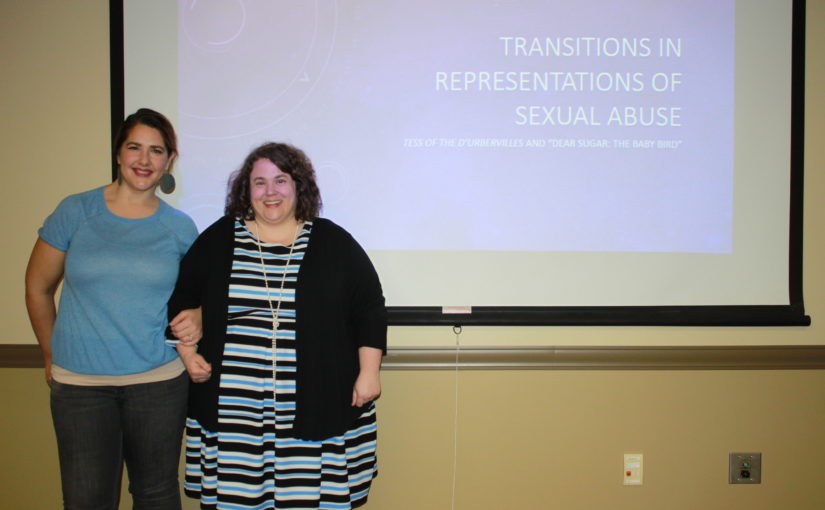Miranda Stambler| THE SPECTRUM
For the beginning of Women’s Week, put on by the women and gender studies department, Kelly Cameron and Natalie Smith Carlson talked about two different representations of sexual abuse in writings.
Cameron has a master’s degree in English, a Ph.D. in rhetoric and composition and a graduate certificate in women’s studies. Carlson has a master’s degree in composition rhetoric, as well as an emphasis on women’s studies.
Throughout the event ,“Transitions in Representations of Sexual Abuse,” on Feb. 26, Cameron talked about an online advice column “Dear Sugar: The Baby Bird,” by Sugar. This piece was about a woman who was sexually abused by her grandfather and uses vulgar language and imagery to show how it affects her everyday life.
The two of them correlated this piece to an older writing, “Tess of the D’Urbervilles” by Thomas Hardy, which demonstrates what many women go through with rape, sexual assault, catcalling and more, all in a book published in 1892. The theme of staying quiet about these actions are throughout the whole text, which is what they hope to change.
Cameron and Carlson are taking information from different time periods and different types of women and men to bring awareness toward this problem that has stayed relevant within our society for a long time, longer than many realize. These two feminists want to give historical background so women are more willing to accept what they have heard and speak up.
With many standing up within the media about their sexual abuse experiences, especially with the #MeToo movement, Carlson explained, “It just seems like an important time to stop and really reflect on this whole situation that’s happening, not really letting it go by.”
“I would assume people who are younger than us, like maybe some of the people who were here (college students), that they don’t know how long things have been going like this,” Carlson said. “I would assume that they might think that it’s a newer thing just because they haven’t had the experience of knowing how long these problems have been.”
Cameron explained how she believes it is important for people to be continuously reminded of the problems within society as well.
A way to help continue the movement of speaking up, Carlson believes we must believe women who speak out and encourage others to do the same. “We’re really conditioned in our culture to dismiss and blame and look the other way, so it’s important to ask people to keep thinking about facing it and standing up for it,” Carlson said.
Carlson explained how even in true stories people are skeptical in “how did the event really go down” or “what did she do” instead of acknowledging that a woman was sexually abused.
Since one focus was written by a man about a woman and the other was written in first-person from a woman’s perspective, one begins to question whether a man writing a story or a woman would be better for listeners to understand. Both Cameron and Carlson agree that it depends on the audience; some men may listen to another man, but it is also now a time that woman want men to step aside and let them speak of their experience.
With the #MeToo movement that just happened and continues to arise, they applied their analysis toward this as well. Carlson explained how the overall cultural society in “Tess of the D’Urbervilles” mirrors our society today in terms of sexual abuse. “A society that makes sexual abuse seem so normal that it’s barely worth commenting on,” Cameron explained further.
They explained how a lot of items in pop culture today show sexual abuse or harassment, but don’t deal with it in a sense to bring awareness, rather they use it as a plot device.
When consuming pop culture, Cameron explains that people should be questioning why that movie or television show is featuring sexual abuse in that story. “I would hope they (audience) would question the purpose — be critical of how it is presented and why,” Cameron said.
Another tip for consuming something involving sexual abuse, Carlson explained that people need to acknowledge any experiences they have been through, “So that you’re ready to turn it off or walk away from it if it gets to be too much — it’s so embedded in the culture to blame the victim that the victim also often times blames themselves too, so they might not even really be in touch what happened to them or they might feel really guilty about it and so watching something like that could be really harmful.”
Both Cameron and Carlson hope these types of events gain a larger audience and spread more awareness to topics that have been issues for a long time.
